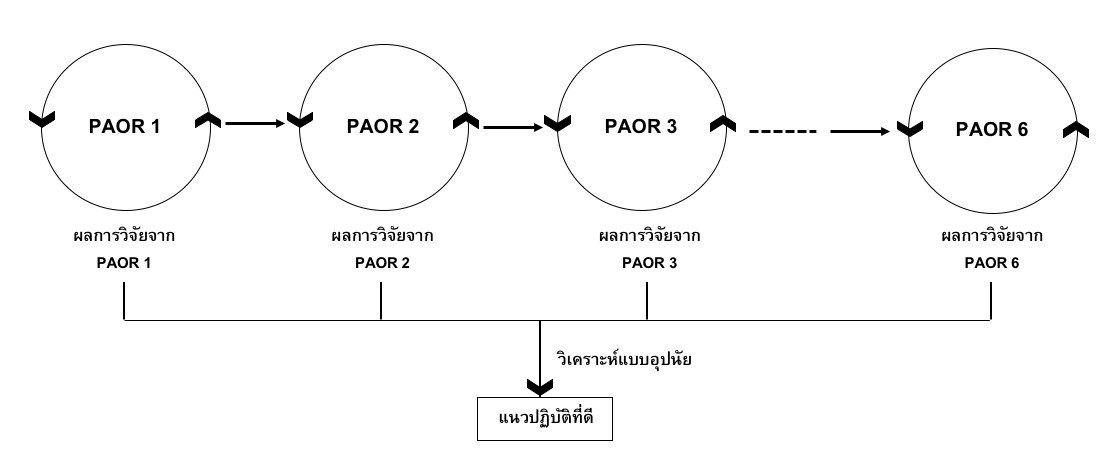แนวปฏิบัติที่ดีในการใช้ประเด็นทางสังคมที่เกี่ยวเนื่องกับวิทยาศาสตร์เพื่อพัฒนาการสร้างคำอธิบายเชิงวิทยาศาสตร์ เรื่อง ระบบต่อมไร้ท่อ
Main Article Content
Abstract
Onnicha Hongkerd, Sasithep Pitiporntapin and Pramote Chumnanpuen
รับบทความ: 1 เมษายน 2561; แก้ไขบทความ: 28 พฤษภาคม 2561; ยอมรับตีพิมพ์: 14 มิถุนายน 2561
บทคัดย่อ
งานวิจัยเชิงปฏิบัติการในชั้นเรียนนี้มีวัตถุประสงค์เพื่อศึกษาแนวปฏิบัติที่ดีในการจัดการเรียนรู้โดยใช้ประเด็นทางสังคมที่เกี่ยวเนื่องกับวิทยาศาสตร์เป็นฐาน เรื่อง “การทำหมันสัตว์” สำหรับพัฒนาการสร้างคำอธิบายเชิงวิทยาศาสตร์ของนักเรียนระดับชั้นมัธยมศึกษาปีที่ 5 ในหน่วยการเรียนรู้เรื่อง ระบบต่อมไร้ท่อ กลุ่มที่ศึกษาคือ นักเรียนระดับชั้นมัธยมศึกษาปีที่ 5 ของโรงเรียนสตรีแห่งหนึ่งในจังหวัดนนทบุรี จำนวน 44 คน กระบวนการวิจัยประกอบด้วย 4 ขั้นตอน ได้แก่ 1) ขั้นวางแผน 2) ขั้นลงมือปฏิบัติ 3) ขั้นสังเกต และ 4) ขั้นสะท้อนผลการปฏิบัติงาน แต่ละขั้นจะมีการดำเนินการต่อเนื่องเป็นวงจร เมื่อดำเนินการเสร็จสิ้นในแต่ละวงจรจะสะท้อนผลการปฏิบัติงานเพื่อนำไปปรับปรุงแก้ไขการดำเนินงานครั้งต่อไป เก็บรวบรวมข้อมูลโดยใช้ใบกิจกรรมของนักเรียน บันทึกหลังการจัดการเรียนรู้ และอนุทินของนักเรียน วิเคราะห์ข้อมูลเชิงคุณภาพจากวงจรการวิจัยด้วยการวิเคราะห์ข้อมูลแบบอุปนัยเพื่อนำมาสรุปเป็นแนวปฏิบัติที่ดีในการจัดการเรียนรู้ ผลการวิจัยพบว่า แนวปฏิบัติที่ดีในการจัดการเรียนรู้โดยใช้ประเด็นทางสังคมที่เกี่ยวเนื่องกับวิทยาศาสตร์เป็นฐานเพื่อพัฒนาความสามารถในการสร้างคำอธิบายเชิงวิทยาศาสตร์ ได้แก่ 1) ให้นักเรียนจดบันทึกข้อมูลที่ใช้ในกิจกรรมอย่างเป็นระบบ เพื่อนำไปใช้ในการอภิปรายในชั้นเรียนได้อย่างมีประสิทธิภาพ 2) ให้นักเรียนเปลี่ยนแปลงจุดยืนของตนได้ และให้โอกาสนักเรียนที่มีความคิดเห็นต่างจากผู้อื่นได้มีการค้นคว้าอย่างอิสระด้วยตนเองเพื่อมาเป็นส่วนหนึ่งของการอภิปรายในห้องเรียน 3) จัดกิจกรรมที่ช่วยให้นักเรียนเห็นตัวอย่างของการใช้หลักฐานและเหตุผลของคำอธิบายเชิงวิทยาศาสตร์ที่ดี เพื่อช่วยให้นักเรียนสร้างคำอธิบายเชิงวิทยาศาสตร์ได้เหมาะสมยิ่งขึ้น และ 4) กำหนดกฎและกติกาสำหรับการทำกิจกรรมในชั้นเรียนเพื่อส่งเสริมการประนีประนอมและกระตุ้นให้นักเรียนมีส่วนร่วมในการอภิปราย
คำสำคัญ: การจัดการเรียนรู้โดยใช้ประเด็นทางสังคมที่เกี่ยวเนื่องกับวิทยาศาสตร์เป็นฐาน การสร้างคำอธิบายเชิงวิทยาศาสตร์ การทำหมันสัตว์ ระบบต่อมไร้ท่อ
Abstract
This classroom action research aimed to study best practices of socioscientific issues (SSIs) – based teaching in topic of “animal sterilization” to develop grade–11 students’ scientific explanation in learning unit of endocrine system. The participants were 44 grade–11 students who studied in the first semester of academic year 2017 from a girl school in Nonthaburi. This action research applied spiral model comprising 4 steps: 1) Plan 2) Act 3) Observe and 4) Reflect. The data were collected by using students’ worksheet, teacher’s reflective journal and students’ reflective journal. Qualitative data were analyzed with inductive analysis to propose the best practices. The findings revealed that best practices for SSIs–based teaching to enhance students’ ability in constructing scientific explanation were: 1) promoting the note–taking skill to capture and organize what they learn, 2) giving students the opportunity to change their point of view, 3) providing adequate examples of scientific explanations to improve their critiquing skill, and 4) creating the class agreement on the active learning activities to engage student participation.
Keywords: Socioscientific issues (SSIs) – based teaching, Scientific explanation, Animal sterilization, Endocrine system
Downloads
Article Details

This work is licensed under a Creative Commons Attribution-NonCommercial 4.0 International License.
References
Chaikit, N. (2008). A Study on Science Learning Achievement and Motivation in Science Learning through Constructivism Learning and Inquiry Process of Matthayomsuksa 1 Students at Srinakharinwirot University Prasarnmit Demonstration School (Secondary). Master of Education Thesis in Secondary Education. Bangkok: Srinakharinwirot University. (in Thai)
Dawson, V. M., and G. Venville. (2010). Teaching strategies for developing students argumentation skills about socioscientific issues in high school genetics. Research in Science Education 40: 133–148.
Eilks, I. (2010). Making chemistry teaching relevant and promoting scientific literacy by focusing on authentic and controversial socio–scientific issues. The Annual Meeting of the Society for Didactics in Chemistry and Physics. Germany: Potsdam.
Fowler, S. R., Zeidler, D. L., and Sadler, T. D. (2009). Moral sensitivity in the context of socioscientific issues in high school students. International Journal of Science Education 31: 279–296.
Kemmis, S., and Mctaggart, R. (1998). The Action Research Planner. Geelong, Victoria: Deakin University.
McNeill, K. L., and Krajcik, J. (2007). Middle school students' use of appropriate and inappropriate evidence in writing scientific explanations. In Lovett, M. C. and Shah, P. (Eds.), Thinking with Data: The Proceedings of the 33rd Carnegie Symposium on Cognition, pp.233–265. Mahwah Erlbaum.
McNeill, K. L., Lizotte, D. J., Krajcik, J., and Marx, R. W. (2006). Supporting students construction of scientific explanations by fading scaffolds in instructional materials. The Journal of the Learning Sciences 15(2): 153–191.
Mercer, N., Dawes, L., Wegerif, R., and Sams, C. (2004). Reasoning as a scientist: Ways of helping children to use language to learn science. British Educational Research Journal 30(3): 359–377.
Moje, E., Collazo, T., Carrillo, R., and Marx, R. (2001). Maestro, what is quality? Language, literacy, and discourse in project–based science. Journal of Research in Science Teaching 38(4): 469–498.
Nagel, E. (1961). The Structure of Science: Problems in the Logic of Science Edu-cation. New York, USA: Harcourt, Brace & World.
Norris, S. P., Guilbert, S. M., and Smith, M. L. (2005). A theoretical framework for narrative explanation in science. Science Education 89: 535–563.
North Central Regional Educational Labora-tory (NCREL). (2003). Focus on Student–Centered Learning/Support Professional Development. Retrieved from http://www.ncrel.org, March 4, 2017.
Organization for Economic Co–operation and Development (OECD). (2009). PISA 2009 Assessment Framework: Key Compe-tencies in Reading, Mathematics and Science. Retrieved from http://www.oecd. org/dataoecd/11/40/44455820.pdf, February 20, 2017
Osborne, J., Erduran, S., and Simon, S. (2004). Enhancing the quality of argumentation in school science. Journal of Research in Science Teaching 41(10): 994–1020.
Toulmin, S. (1958). The Uses of Argument. Cambridge, England: Cambridge University.
Zeidler, D. L., and Nicols, B. (2009). Socioscientific issue: Theory and practice. Journal of Elementary Science Education 21(2): 49–58.
